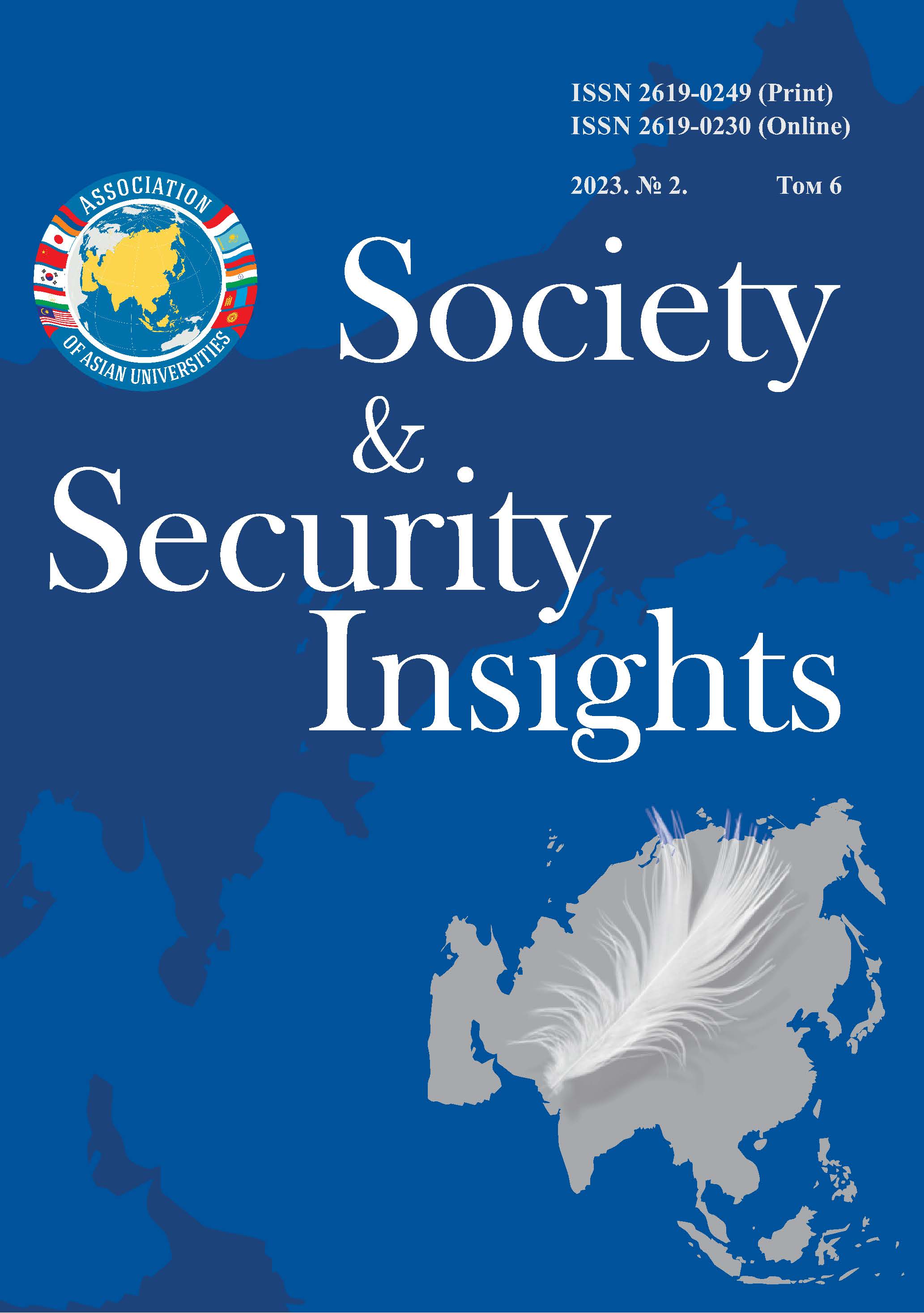TYPOLOGY OF THE POPULATION IN RELATION TO THE VALUE OF HUMAN LIFE: HEALTH-SAVING ASPECT
Main Article Content
Abstract
Behavioral risk factors continue to play a significant role in the health of the population, and individual perception of risk and the value of human life are important markers of social security. The study of the value of life through the prism of risky behavior allows us to assess the attitude of the population to risk both their own and others' lives and health, to identify circumstances that allow this. The use of empirical sociology methods makes it possible to take into account the individual characteristics of respondents (values, attitudes, motives, practices), which is extremely important for explaining and controlling risks. The purpose of this article was to identify the types of population in relation to the value of human life (their own and others') and to determine the characteristics of their health-saving behavior based on the data of a representative sociological survey. The information base was the results of the next stage of sociological monitoring of the physical health of the Vologda Oblast population, conducted in 2022 (N=1500). The methods of sociological survey (questionnaire), factorial, cluster and descriptive analysis were used in the study. In the course of the work, three clusters of the population in relation to the value of human life were identified: "humanists", "defenders" and "materialists with a low value of life and health". The differences of clusters in socio-demographic characteristics and parameters of health–saving behavior - practices and motives of health care, barriers of longevity are revealed. The data obtained on the types of the population in relation to the value of life can serve as a basis for the development of specialized measures for the prevention of behavioral health risk factors, and monitoring of the identified categories of the population will allow tracking changes in their health-saving behavior, which is especially important in conditions of instability and external shocks
Downloads
Metrics
Article Details

This work is licensed under a Creative Commons Attribution 4.0 International License.
Authors retain the copyright of their manuscripts, and all Open Access articles are distributed under the terms of the Creative Commons Attribution License, which permits unrestricted use, distribution, and reproduction in any medium, provided that the original work is properly cited.
References
Глобальные факторы риска для здоровья. Смертность и бремя болезней, обусловленные некоторыми основными факторами риска // Всемирная организация здравоохранения, 2015. 70 с.
Журавлева И.В. Отношение к здоровью индивида и общества; Ин-т социологии РАН. М.: Наука, 2006. 238 с.
Мозговая А.В. Измерение риска в социологии: методология, методы, результаты // Риск: исследования и социальная практика / Отв. ред. А.В. Мозговая. М.: Институт социологии РАН, 2011. С. 40–58.
Мозговая А.В., Шлыкова Е.В. «Социальная приемлемость риска» как социологическая категория // Социология: методология, методы, математическое моделирование. 2010. № 31. С. 30–45.
Мозговая А.В., Шлыкова Е.В. Отношение к ценности жизни как фактор восприятия населением террористической угрозы // Научный результат. Социология и управление. 2020. Т. 6, № 2. С. 101–116. DOI: 10.18413/2408-9338-2020-6-2-0-7
Нацун Л.Н., Разварина И.Н., Смолева Е.О. Рискованное деструктивное поведение подростков и условия его формирования // Проблемы развития территории. 2017. № 1 (87). С. 114–129.
Новоселова Е.Н. Здоровье как ценность и результат деятельности: проблемы и противоречия // Вестник Московского университета. Серия 18. Социология и политология. 2021. Т. 27, № 3. С. 81–104. DOI: https://doi.org/10.24290/1029-3736-2021-27-3-81-104
Омельченко Д.А., Максимова С.Г., Ноянзина О.Е. Восприятие социальной безопасности населением регионов Азиатского приграничья России (на примере Алтайского края) // Society and Security Insights. 2020. Т. 3, № 1. С. 13–36. DOI: 10.14258/ssi(2020)1-01
Рахимкулова А.С. Последствия рискованного поведения для физического и психического здоровья подростков // Девиантология. 2020. Т. 4, № 1. C. 3–15. DOI: 10.32878/devi.20-4-01(6)-3-15
Фарахутдинов Ш.Ф., Бушуев А.С. Обработка и анализ данных социологических исследований в пакете SPSS 17.0. Курс лекций: учебное пособие. Тюмень: ТюмГНГУ, 2011. 220 с.
REFERENCES
Barg, A.O., Lebedeva-Nesevrya, N.A. (2014). Risk-communication as an effective way of producing the cumulative acceptability of human health risks. Public Health and Life Environment – PH&LE, 12, 9–11.
Global health risks: mortality and burden of disease attributable to selected major risks (2015). World Health Organization.
Zhuravleva, I.V. (2006). Attitude to the health of the individual and society. Institute of Sociology of the Russian Academy of Sciences, Moscow: Nauka.
Mozgovaya, A.V. (2011). Risk measurement in sociology: methodology, methods, results. In A.V. Mozgovaya (Eds.). Risk: research and social practice (pp. 40–58). Moscow: Institut sociologii RAN.
Mozgovaya, A.V., Shlykova, E.V. (2010). “Social Acceptability of Risk” as a Sociological Concept. Sociology: Methodology, Methods, Mathematical Modeling (Sociology: 4M), 31, 30–45.
Mozgovaya, A.V., Shlykova, E.V. (2020). “View to the value of life as a factor of population’s perception of the terrorist threat”. Research Result. Sociology and management, 6(2), 101–116. doi: 10.18413/2408-9338-2020-6-2-0-7
Natsun, L.N., Razvarina, I.N., Smoleva, E.O. (2017). Risky Destructive Behavior of Adolescents and Conditions of its Shaping. Problems of Territory's Development, 1(87), 114–129.
Novoselova, E.N. (2021). Health as a value and a result of activity: problems and contradictions. Moscow State University Bulletin. Series 18. Sociology and Political Science, 27(3), 81–104. doi: https://doi.org/10.24290/1029-3736-2021-27-3-81-104
Omelchenko, D.A., Maximova, S.G., Noyanzina, O.E. (2020). Perception of social security in regions of the Russian-Asian borderland (on the example of the Altai region). Society and Security Insights, 3(1), 13–36. doi: https://doi.org/10.14258/ssi(2020)1-01
Rakhimkulova, A.S. (2020). Consequences of risky behavior for the physical and mental health of adolescents. Deviant Behavior (Russia), 4(1), 3–15. DOI: 10.32878/devi.20-4-01(6)-3-15
Farakhutdinov, Sh.F., Bushuev, A.S. (2011). Processing and analysis of sociological research data in the SPSS 17.0 package. Course of lectures: textbook. Tyumen: TyumGNGU.


 https://orcid.org/0000-0002-7699-0181
https://orcid.org/0000-0002-7699-0181